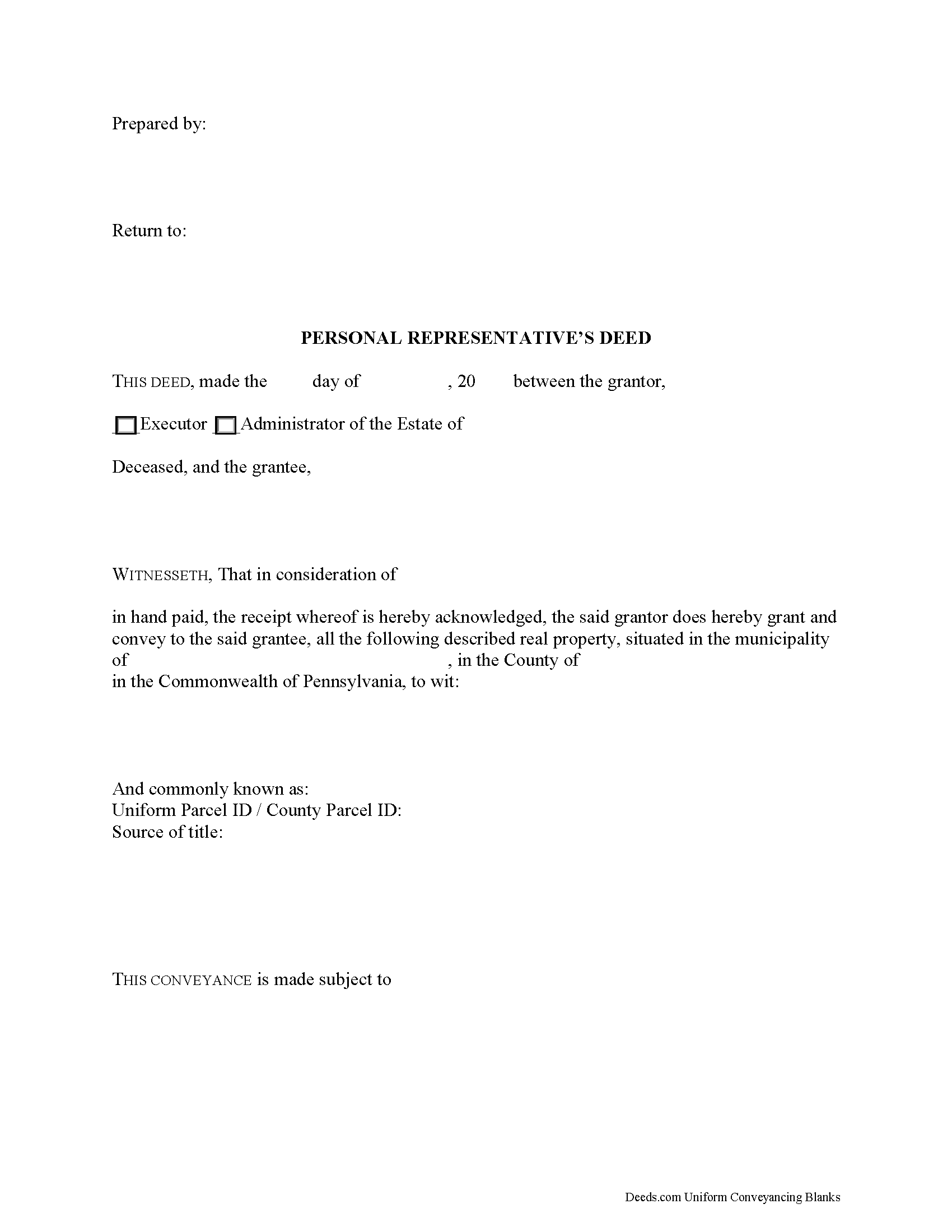Download Pennsylvania Personal Representative Deed Legal Forms

Pennsylvania Personal Representative Deed Overview

Using a Personal Representative's Deed in Pennsylvania
--
The information provided in this article is not meant to be exhaustive, and should not take the place of legal advice. We strongly recommend consulting a lawyer when administering an estate, as each situation is unique. Personal representatives have a fiduciary duty to serve in the estate's best interests, and are "personally liable for undue mistakes made in the administration of the decedent's estate" [1].
--
When Pennsylvania residents die, their estate is admitted to probate, regardless of whether they left a will. A will is a legal document whereby a person (testator) gives directions for the distribution of personal assets upon death, and identifies who will administer the estate. Probate is the legal process of distributing assets. In the Commonwealth of Pennsylvania, this process, also referred to as estate administration, is governed by Title 20 et seq. of the Pennsylvania Code (Decedents, Estates, and Fiduciaries).
A probate case begins with the Register of Wills for the county where the deceased claimed permanent residence. Those with property situated in two or more counties also require ancillary probate proceedings. The decedent's will, if one exists, is recorded at this time, along with supporting documents (ex. death certificate, affidavit of subscribing or non-subscribing witness, petition for grant of letters). Pennsylvania implements an expedited probate for estates valued under $50,000.
Upon petition for grant of letters, the Register of Wills issues letters of administration or letters testamentary, depending on whether the decedent died testate (with a will) or intestate (without a will). The letters are a document granting formal authority to the fiduciary who will administer the estate, and are filed as part of the probate case. Fiduciaries may also obtain a short certificate from the Register certifying their capacity to administer the decedent's estate.
This fiduciary is known generally as a "personal representative," or more specifically as either an executor (or executrix, if female) or an administrator. The term "executor" is used when the decedent died with a will and named an executor. The term "administrator" is used when (1) the decedent died without a will (2) the decedent died testate but failed to name an executor in the will, or (3) the decedent died with a will and named an executor, but the executor failed or ceased service. In short, an executor is someone designated by will as the personal representative, whereas an administrator is someone appointed by the Register.
All assets owned solely by the decedent must go through probate. Concerning real property, when the decedent vests title as a sole owner or as a tenant in common, the real property will need to go through probate before it can be distributed by the personal representative. Real property vested with rights of survivorship between or among joint tenants or between husband and wife as tenants by the entirety automatically vests in the surviving joint tenant(s) or spouse. Property held in trust may also avoid probate.
The personal representative has several responsibilities as fiduciary, including submitting a comprehensive inventory of the estate, filing a Pennsylvania Inheritance Tax Return, giving notice to beneficiaries, and paying any debts, before any distribution of assets can occur. Depending on the situation, this process may take several months, so seek legal advice to ensure that all requisite steps are met.
When the decedent leaves instructions for the succession of real property, the named beneficiaries in the will are called devisees. When there is no will, Pennsylvania laws of intestacy determine the succession of the decedent's real property, with title flowing to the decedent's heirs at law. Depending on the situation, the personal representative may sell the decedent's real property [2].
In Pennsylvania, both executors and administrators use the personal representative's deed to distribute or sell real property. As with other types of deeds executed by grantors in a representative capacity (such as trustee's deeds), the personal representative's deed in Pennsylvania typically carries a special warranty, covenanting that the grantor will warrant and defend the property against the lawful claims and demands of the grantor or grantors, and all persons claiming or to claim by, through, or under him or them (21 P.S. 6). The special warranty is fitting for grantors who are transferring property indirectly, or on behalf of, an estate, as they may not have comprehensive knowledge of the title's history prior to the decedent's death.
The deed identifies the acting personal representative as either an executor or administrator, as well as the decedent and date of death. In addition to the grantee and vesting information, legal description of the subject property, and title derivation required for documents pertaining to interests in real property, the personal representative's deed cites the date of the testator's will, if any; the date of probate; the county of probate; the file or case number; and the name of the personal representative.
The deed is signed by the acting representative in the presence of a notary public and recorded in the county Register of Deeds in which the subject real property is situated. Additional notices may be required in Pennsylvania concerning coal and mine subsidence, and supporting documents such as a death certificate and a short certificate may be required to verify the personal representative's authority to convey real property.
To formally close probate, the personal representative must file a report of completion with the register of wills.
If administration of estate not complete within two years of the decedent's date of death, the personal representative may have to file a status report with Register of Wills.
See more forms relating to estate administration at http://www.revenue.pa.gov/FormsandPublications/FormsforIndividuals/Pages/Inheritance-Tax.aspx#.WFABK-YrLIU.
Contact a lawyer with questions regarding estate administration and probate in Pennsylvania.
[1] http://www.whiteandwilliams.com/resources-alerts-Personal-Representatives-and-Fiduciaries-Executors-Administrators-and-Trustees-and-Their-Duties.html
[2] http://www.stallardlawoffice.com/single-post/2015/09/19/Posts-on-Pennsylvania-Real-Property-Title-Death-Wills-and-Joint-Ownership
(Pennsylvania PRD Package includes form, guidelines, and completed example)